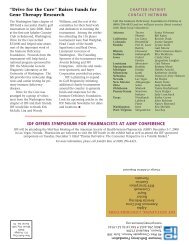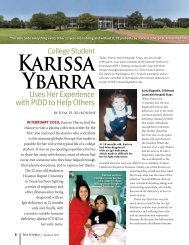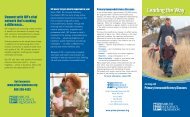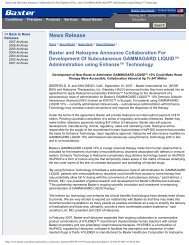IDF Patient & Family Handbook for Primary Immunodeficiency ... - IDFA
IDF Patient & Family Handbook for Primary Immunodeficiency ... - IDFA
IDF Patient & Family Handbook for Primary Immunodeficiency ... - IDFA
You also want an ePaper? Increase the reach of your titles
YUMPU automatically turns print PDFs into web optimized ePapers that Google loves.
Infants and Children with <strong>Primary</strong> <strong>Immunodeficiency</strong> Diseases 109<br />
A Child’s Understanding of Illness<br />
Very young children can sound like experts<br />
regarding their illness when they repeat the words<br />
and explanations they have heard adults use.<br />
However, the ability to repeat such statements<br />
does not indicate that children truly understand the<br />
meaning of the words they have just used. Asking a<br />
child, “What does that mean to you?” can help you<br />
evaluate his or her individual level of understanding.<br />
As children continue to grow and develop, they will<br />
need to revisit questions related to their primary<br />
immunodeficiency disease (e.g. “What is this<br />
illness?”; “How come I have it?”; “How did I get it?”;<br />
“What’s the medicine <strong>for</strong> and why do I need it?”).<br />
Sometimes changes in your child’s behavior can be<br />
a clue to initiate these conversations.<br />
School-age Child<br />
The child begins to develop an understanding of<br />
the interior body and an understanding of illness.<br />
This age-group benefits from employing their<br />
natural curiosity to facilitate understanding about<br />
the body systems and their specific symptoms<br />
and treatments. Books and/or videos, such<br />
as children’s anatomy books (resources listed<br />
in the Resources section) and even science<br />
“experiments” can encourage more advanced<br />
discussion and understanding.<br />
Preschool Child<br />
The child may perceive treatment, procedures,<br />
or hospitalization as punishment because of their<br />
immature understanding. What these children<br />
need to know is that they did not cause the illness<br />
and that the treatments are not punishment—<br />
instead it is the best way the doctors and nurses<br />
know <strong>for</strong> helping them stay well or get better. If it’s<br />
a particularly challenging treatment or procedure,<br />
it may help to say, “we wish there was an easier<br />
way, but this is the best way.”<br />
Learning from Your Children<br />
Children are resilient. However, there may be<br />
times when you are not sure how well your child is<br />
coping. You may have noticed some changes in<br />
your child’s behavior that occur more commonly<br />
than the occasional tough day that all children have.<br />
Watch <strong>for</strong> continuing patterns of:<br />
• eating or sleep disturbances<br />
• changes in school per<strong>for</strong>mance<br />
• an increase or appearance of fears<br />
• changes in social behavior<br />
• regression in developmental milestones<br />
• withdrawing from others<br />
These actions may alert you that your child needs<br />
some extra support. Often, talking and giving your<br />
child the opportunity to share concerns with you<br />
and together planning ways to cope in the future is<br />
all that’s needed.<br />
Other times, children and parents may benefit from<br />
additional support from extended family and friends,<br />
and caring adults in the child’s school or community<br />
(such as guidance counselors, religious youth group<br />
leaders, and mental health providers).
















